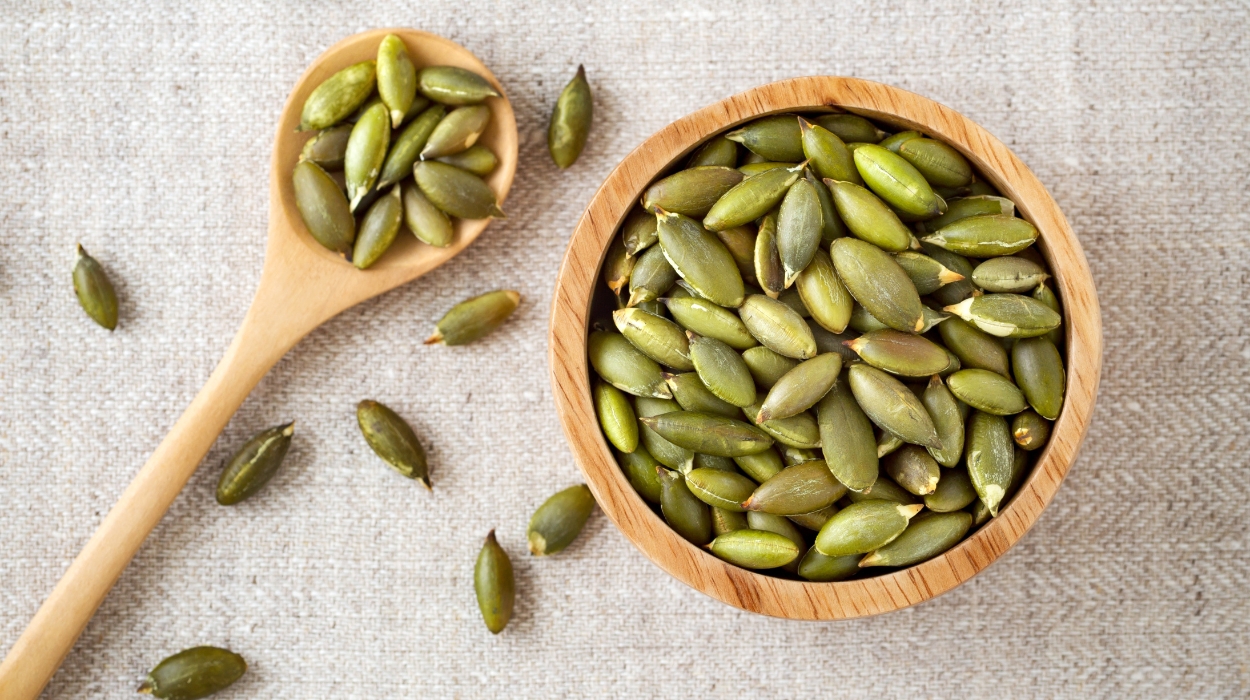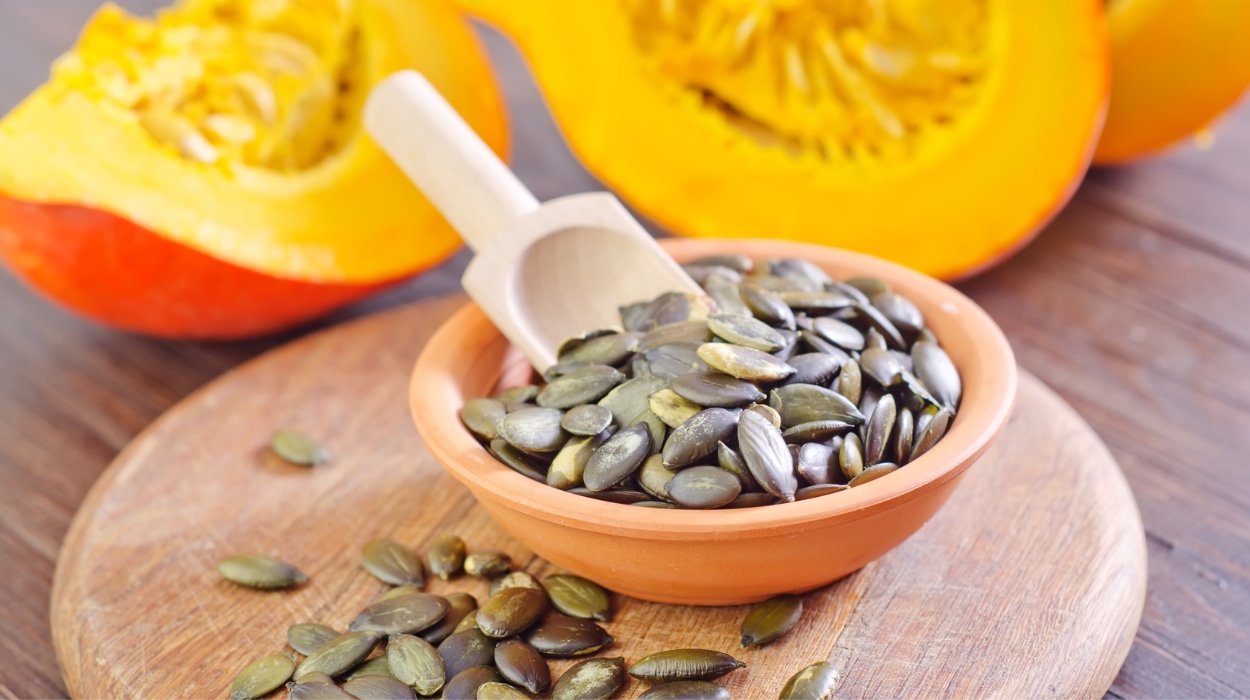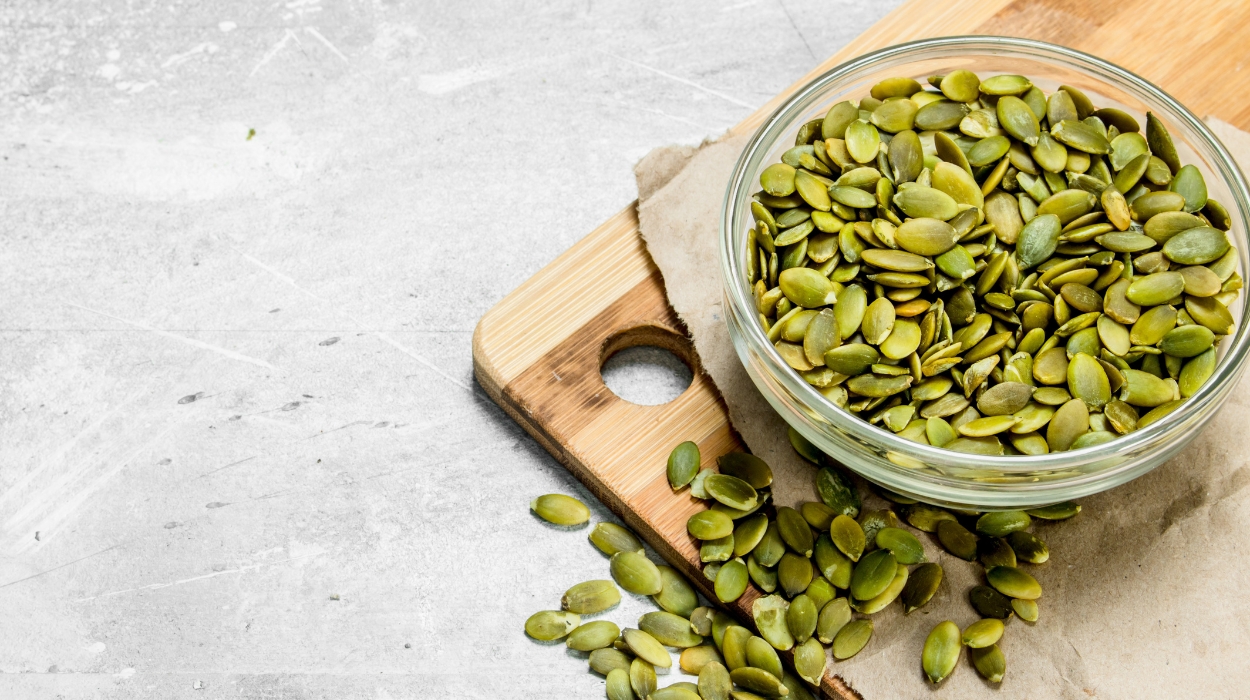 Expert's opinion
Expert's opinion
Expert's opinion
The article is a subjective view on this topic written by writers specializing in medical writing.
It may reflect on a personal journey surrounding struggles with an illness or medical condition, involve product comparisons, diet considerations, or other health-related opinions.
Although the view is entirely that of the writer, it is based on academic experiences and scientific research they have conducted; it is fact-checked by a team of degreed medical experts, and validated by sources attached to the article.
The numbers in parenthesis (1,2,3) will take you to clickable links to related scientific papers.
Pumpkin Seeds For Weight Loss 2024: Is It Effective? Benefits & Diet

Many people ask whether to eat pumpkin seeds for weight loss. Pumpkin and their seeds are highly nutritious, but should you eat higher-fat foods such as nuts and seeds when trying to lose weight?
In fact, scientific evidence tells us that pumpkin seeds help promote healthy weight management when eaten as part of a healthy diet.
Read on to find out why you should eat pumpkin seeds for weight loss, how they work to help you lose weight, and how many pumpkin seeds you should eat.
Are Pumpkin Seeds Good For Weight Loss?
Yes! Pumpkin seeds are rich in fiber, healthy fats, and other essential nutrients that slow digestion, increase satiety, and reduce inflammation, all of which play a crucial role in weight management.
Are Pumpkin Seeds Good For Weight Loss?
Today, most people’s diets consist of many processed foods that promote weight gain. These foods are high in calories, high in refined fats and carbohydrates, and low in fiber, all of which make it easy to put on more weight – and very difficult to lose weight.
On the other hand, regularly eating seeds[1] is linked to a lower body mass index (BMI), lower cholesterol levels, and more.
Pumpkin seeds are high in fiber, healthy fats, and other valuable nutrients that slow digestion, increase satiety, and reduce inflammation, all of which play an important role in weight loss.
Read on to learn about pumpkin seeds’ weight loss benefits.
High In Fiber
Pumpkin seeds are high in fiber,[2] which slows down digestion, slows the absorption of fats, and makes you feel fuller for longer.[3]
Different types of fiber help with weight loss in different ways. The soluble fiber reduces blood sugar levels after a meal, improves insulin sensitivity, and reduces the absorption of macronutrients.
For instance, eating 65 g of pumpkin seeds can significantly lower your blood sugar[4] after a meal. In addition, the insoluble fiber creates bulk in your stomach and increases satiety.[5]
Also, fiber helps feed your gut microbiome, which increases levels of good bacteria – some of which are linked to better weight management.
High In Essential Fatty Acids
Oil makes up most of the pumpkin seed – in fact, 42% of pumpkin seed is fat.[6] These fats are mainly polyunsaturated fatty acids (PUFAs) and monounsaturated fatty acids (MUFA), such as oleic acid.
Are Pumpkin Seeds Fattening?

Most people think pumpkin seeds are fattening because they’re high in fats. But, in fact, it’s the opposite.
PUFAs and MUFAs are both anti-inflammatory, which can reduce insulin resistance and improve weight loss outcomes.
One animal study[7] found that pumpkin seed oil helped prevent weight gain on a high-fat diet. The rats who received the seed oil also had lower blood sugar and insulin levels.
Another similar study[8] found that pumpkin seed oil also reduced markers of inflammation.
Leptin Regulation And Weight Loss
PUFAs and MUFAs can influence your leptin levels.[9] Leptin is your satiety hormone – levels increase as you eat and tell your brain when you’re full and to stop eating.
However, too many spikes in leptin may lead to leptin resistance,[10] resulting in chronically high leptin levels, which are associated with weight gain.[11]
Overall, the lower your leptin levels, the healthier your leptin feedback system.[12] High-quality fats from nuts and seeds may play a role in regulating healthy leptin levels.[13]
Protect You From Obesity-Inducing Chemicals
Bisphenol-A (BPA) is an additive in plastics linked to hormone disruption, acne, infertility, some cancers,[14] and weight gain.[15] In fact, out of all the pesticides and additives in our food, BPA is considered one of the most obesity-promoting chemicals.[16]
Unfortunately, BPA is everywhere in contact with food – plastic packaging,[17] kitchenware, the inner coatings of cans, and jar caps.
Studies have shown[18] that pumpkin seed oils can even protect your DNA from damage by bisphenol-A (BPA). This protective property of pumpkin seed oils is important because exposure to BPAs, especially in childhood, has been linked to obesity.[15]
A Rich Source Of Phytoestrogens
Secoisolariciresinol diglucoside, otherwise known as SDG, is an antioxidant phytoestrogen present in pumpkin seeds,[19] as well as flax seeds, sesame seeds, and sunflower seeds.
SDG has cholesterol-lowering[20] and blood sugar balancing[21] effects, and dietary phytoestrogens in general may help contribute to weight loss.[22]
High In Protein
Pumpkin seeds are one of the seeds highest in protein. Eating more protein – whether plant-based or animal-based – is linked to[23] feeling fuller, better appetite control, and lower calorie intake.
If you’re looking for plant-based foods to burn fat and build muscle, pumpkin seeds are an especially high vegan source of the branched-chain amino acid leucine,[24] which stimulates muscle synthesis.
Pumpkin Seeds Nutritional Value
- High in zinc, an important nutrient for your immune system, gut health, hair, skin, and nails.[25] One 30 g serving (2 tbsp) provides 2 mg zinc.
- High in magnesium, an important nutrient for heart health,[26] blood pressure,[27] bone health,[28] and balancing blood sugar.[29]
- High in iron, with 2.4 mg per 30 g serving (2 tbsps).
Other Health Benefits Of Pumpkin Seeds

It’s not just weight loss pumpkin seeds prove to be good for. They are one of the most nutritious edible seeds you can buy – here’s why.
- High in antioxidants, which protect your body from oxidative damage[30] and can promote longevity.[31]
- High in phytoestrogens and polyphenols, which have chemoprotective properties and can help prevent some types of cancers, including breast cancer[32] as demonstrated in a couple of cell cultures and prostate cancer.[33]
- Lowers bad cholesterol levels and helps balance blood sugar levels,[34] according to a study in rats, maintaining healthy blood vessels and reducing the risk of chronic diseases such as cardiovascular disease and type 2 diabetes.
- Can help promote mental well-being and improve sleep.[35] The high levels of magnesium help break down stress hormones[36] and synthesize the sleep hormone, melatonin.
How To Include Pumpkin Seeds In Your Diet?
Here are some top tips to include more nutritious pumpkin seeds in your balanced diet.
Snacking On Plain Pumpkin Seeds
The most obvious way to include pumpkin seeds in your diet is by snacking on them directly. You can have healthy snacks with salted pumpkin seeds, but we recommend unsalted pumpkin seeds – especially if you’re watching your salt intake.
Add Pumpkin Seeds To Baking
Eating pumpkin seeds in bread is an easy way to get a daily dose without even trying. Simply add some pumpkin seeds to baked goods next time, or choose bread with added seeds from the store.
In Smoothies
If you have a high-speed blender, you can add pumpkin seeds to smoothies.
Batch-Roast Pumpkin Seeds
Studies show that roasted pumpkin seeds contain more bioavailable nutrients than raw pumpkin seeds.
Gently toast or roast a batch of pumpkin seeds and store them in a jar so you can sprinkle them on breakfast or salads at any time you fancy. Presoaking them before roasting can also reduce the antinutrients such as lectins.
In A Nut And Seed Mix As A Healthy Snack
A great healthy snack is a nut and seed mix with pumpkin seeds. However, shop-bought nut and seed mixes can be expensive – pre-mixing your own is cheaper in the long run. Keep them in a jar on the worktop in your kitchen, so you remember to snack on them.
Sprinkled On Meals
Once you’ve pre-mixed and pre-roasted your pumpkin seeds, it’s easy to add them to pretty much any meal you make. Here are some ideas:
- On top of oatmeal
- On a smoothie bowl
- Mixed into salads
Pumpkin Seed Pesto
Do you ever go to make pesto, and then see how expensive pine nuts are? Pumpkin seeds are a great, healthy alternative to pine nuts when making your own homemade pesto.
How Many Tablespoons Of Pumpkin Seeds Per Day?
Most studies on pumpkin seeds provide them in 30 g portions, which is around two tablespoons of pumpkin seeds as a daily intake.
Summary
Pumpkin seeds are tasty, healthy foods high in healthy fats and fiber to eat every day for their incredible health benefits. They’re also packed with antioxidants and essential minerals.
Pumpkin seeds can help lower blood sugar, lower cholesterol levels, and even protect you from cancer-causing chemicals. They can also improve appetite control and reduce inflammation, which can help with your weight loss journey.
If you want to eat pumpkin seeds for weight loss, we recommend eating a 30 g portion per day as part of a healthy weight loss diet.
+ 36 sources
Health Canal avoids using tertiary references. We have strict sourcing guidelines and rely on peer-reviewed studies, academic researches from medical associations and institutions. To ensure the accuracy of articles in Health Canal, you can read more about the editorial process here
- Kopčeková, J., Lenártová, P., Mrázová, J., Gažarová, M., Habánová, M. and Jančichová, K. (2021). The relationship between seeds consumption, lipid profile and body mass index among patients with cardiovascular diseases. Roczniki Państwowego Zakładu Higieny, [online] pp.145–153. doi:10.32394/rpzh.2021.0159.
- Nyam KL;Lau M;Tan CP (2013). Fibre from pumpkin (Cucurbita pepo L.) seeds and rinds: physico-chemical properties, antioxidant capacity and application as bakery product ingredients. Malaysian journal of nutrition, [online] 19(1). Available at: https://pubmed.ncbi.nlm.nih.gov/24800388/
- Anderson, J.W., Baird, P., Davis Jr, R.H., Ferreri, S., Knudtson, M., Koraym, A., Waters, V. and Williams, C.L. (2009). Health benefits of dietary fiber. Nutrition Reviews, [online] 67(4), pp.188–205. doi:10.1111/j.1753-4887.2009.00189.x.
- Cândido, F.G., de Oliveira, F.C.E., Lima, M.F.C., Pinto, C.A., da Silva, L.L., Martino, H.S.D., dos Santos, M.H. and Alfenas, R. de C.G. (2018). Addition of pooled pumpkin seed to mixed meals reduced postprandial glycemia: a randomized placebo-controlled clinical trial. Nutrition Research, [online] 56, pp.90–97. doi:10.1016/j.nutres.2018.04.015.
- Hernández-Pérez, T., Valverde, M.E. and Paredes-López, O. (2021). Seeds from ancient food crops with the potential for antiobesity promotion. Critical Reviews in Food Science and Nutrition, [online] 62(17), pp.4563–4570. doi:10.1080/10408398.2021.1877107.
- Li, Y., Yuan, F., Wu, Y., Zhang, Y., Gao, B. and Yu, L. (2020). Triacylglycerols and Fatty Acid Compositions of Cucumber, Tomato, Pumpkin, and Carrot Seed Oils by Ultra-Performance Convergence Chromatography Combined with Quadrupole Time-of-Flight Mass Spectrometry. Foods, [online] 9(8), p.970. doi:10.3390/foods9080970.
- Kalaivani, A., Sathibabu Uddandrao, V.V., Brahmanaidu, P., Saravanan, G., Nivedha, P.R., Tamilmani, P., Swapna, K. and Vadivukkarasi, S. (2017). Anti obese potential of Cucurbita maxima seeds oil: effect on lipid profile and histoarchitecture in high fat diet induced obese rats. Natural Product Research, [online] 32(24), pp.2950–2953. doi:10.1080/14786419.2017.1389939.
- A., K., Uddandrao, V.V.S., Parim, B., Ganapathy, S., P. R., N., Kancharla, S.C., P., R., K., S. and Sasikumar, V. (2018). Reversal of high fat diet-induced obesity through modulating lipid metabolic enzymes and inflammatory markers expressions in rats. Archives of Physiology and Biochemistry, [online] 125(3), pp.228–234. doi:10.1080/13813455.2018.1452036.
- Polak, A.M., Krentowska, A., Łebkowska, A., Buczyńska, A., Adamski, M., Adamska-Patruno, E., Fiedorczuk, J., Krętowski, A.J., Kowalska, I. and Adamska, A. (2020). The Association of Serum Levels of Leptin and Ghrelin with the Dietary Fat Content in Non-Obese Women with Polycystic Ovary Syndrome. Nutrients, [online] 12(9), p.2753. doi:10.3390/nu12092753.
- Myers, M.G., Leibel, R.L., Seeley, R.J. and Schwartz, M.W. (2010). Obesity and leptin resistance: distinguishing cause from effect. Trends in Endocrinology & Metabolism, [online] 21(11), pp.643–651. doi:10.1016/j.tem.2010.08.002.
- Klok, M.D., Jakobsdottir, S. and Drent, M.L. (2007). The role of leptin and ghrelin in the regulation of food intake and body weight in humans: a review. Obesity Reviews, [online] 8(1), pp.21–34. doi:10.1111/j.1467-789x.2006.00270.x.
- Pan, W.W. and Myers, M.G. (2018). Leptin and the maintenance of elevated body weight. Nature Reviews Neuroscience, [online] 19(2), pp.95–105. doi:10.1038/nrn.2017.168.
- Rostami, H., Samadi, M., Yuzbashian, E., Zarkesh, M., Asghari, G., Hedayati, M., Daneshafrooz, A., Mirmiran, P. and Khalaj, A. (2017). Habitual dietary intake of fatty acids are associated with leptin gene expression in subcutaneous and visceral adipose tissue of patients without diabetes. Prostaglandins, Leukotrienes and Essential Fatty Acids, [online] 126, pp.49–54. doi:10.1016/j.plefa.2017.09.010.
- Konieczna A;Rutkowska A;Rachoń D (2015). Health risk of exposure to Bisphenol A (BPA). Roczniki Panstwowego Zakladu Higieny, [online] 66(1). Available at: https://pubmed.ncbi.nlm.nih.gov/25813067/
- Braun, J.M. (2016). Early-life exposure to EDCs: role in childhood obesity and neurodevelopment. Nature Reviews Endocrinology, [online] 13(3), pp.161–173. doi:10.1038/nrendo.2016.186.
- Zhang, Y., Dong, T., Hu, W., Wang, X., Xu, B., Lin, Z., Hofer, T., Stefanoff, P., Chen, Y., Wang, X. and Xia, Y. (2019). Association between exposure to a mixture of phenols, pesticides, and phthalates and obesity: Comparison of three statistical models. Environment International, [online] 123, pp.325–336. doi:10.1016/j.envint.2018.11.076.
- Kaya Ozden, H. and Karadag, A.S. (2021). Could endocrine disruptors be a new player for acne pathogenesis? The effect of bisphenol A on the formation and severity of acne vulgaris: A prospective, case‐controlled study. Journal of Cosmetic Dermatology, [online] 20(11), pp.3573–3579. doi:10.1111/jocd.14364.
- Fawzy, E.I., El Makawy, A.I., El-Bamby, M.M. and Elhamalawy, H.O. (2018). Improved effect of pumpkin seed oil against the bisphenol-A adverse effects in male mice. Toxicology Reports, [online] 5, pp.857–863. doi:10.1016/j.toxrep.2018.08.014.
- Patel, D., Jitendra Vaghasiya, Shyam SUNDER Pancholi and Paul, A. (2012). Therapeutic Potential of Secoisolariciresinol Diglucoside: A Plant Lignan. [online] ResearchGate. Available at: https://www.researchgate.net/publication/259757007_Therapeutic_Potential_of_Secoisolariciresinol_Diglucoside_A_Plant_Lignan
- Prasad, K. and Jadhav, A. (2015). Prevention and treatment of atherosclerosis with flaxseed -derived compound secoisolariciresinol diglucoside. Current Pharmaceutical Design, [online] 22(2), pp.214–220. doi:10.2174/1381612822666151112151130.
- Zhang, W., Wang, X., Liu, Y., Tian, H., Flickinger, B., Empie, M.W. and Sun, S.Z. (2008). Dietary flaxseed lignan extract lowers plasma cholesterol and glucose concentrations in hypercholesterolaemic subjects. British Journal of Nutrition, [online] 99(6), pp.1301–1309. doi:10.1017/s0007114507871649.
- Bhathena, S.J. and Velasquez, M.T. (2002). Beneficial role of dietary phytoestrogens in obesity and diabetes. The American Journal of Clinical Nutrition, [online] 76(6), pp.1191–1201. doi:10.1093/ajcn/76.6.1191.
- Lonnie, M., Laurie, I., Myers, M., Horgan, G., Russell, W. and Johnstone, A. (2020). Exploring Health-Promoting Attributes of Plant Proteins as a Functional Ingredient for the Food Sector: A Systematic Review of Human Interventional Studies. Nutrients, [online] 12(8), p.2291. doi:10.3390/nu12082291.
- Brennan, J.L., Keerati-u-rai, M., Yin, H., Daoust, J., Nonnotte, E., Quinquis, L., St-Denis, T. and Bolster, D.R. (2019). Differential Responses of Blood Essential Amino Acid Levels Following Ingestion of High-Quality Plant-Based Protein Blends Compared to Whey Protein—A Double-Blind Randomized, Cross-Over, Clinical Trial. Nutrients, [online] 11(12), p.2987. doi:10.3390/nu11122987.
- DiBaise, M. and Tarleton, S.M. (2019). Hair, Nails, and Skin: Differentiating Cutaneous Manifestations of Micronutrient Deficiency. Nutrition in Clinical Practice, [online] 34(4), pp.490–503. doi:10.1002/ncp.10321.
- Peacock, J.M., Ohira, T., Post, W., Sotoodehnia, N., Rosamond, W. and Folsom, A.R. (2010). Serum magnesium and risk of sudden cardiac death in the Atherosclerosis Risk in Communities (ARIC) Study. American Heart Journal, [online] 160(3), pp.464–470. doi:10.1016/j.ahj.2010.06.012.
- Dickinson, H.O., Nicolson, D., Campbell, F., Cook, J.V., Beyer, F.R., Ford, G.A. and Mason, J. (2006). Magnesium supplementation for the management of primary hypertension in adults. Cochrane Database of Systematic Reviews. [online] doi:10.1002/14651858.cd004640.pub2.
- Rude, R.K., Singer, F.R. and Gruber, H.E. (2009). Skeletal and Hormonal Effects of Magnesium Deficiency. Journal of the American College of Nutrition, [online] 28(2), pp.131–141. doi:10.1080/07315724.2009.10719764.
- Larsson, S.C. and Wolk, A. (2007). Magnesium intake and risk of type 2 diabetes: a meta-analysis. Journal of Internal Medicine, [online] 262(2), pp.208–214. doi:10.1111/j.1365-2796.2007.01840.x.
- Höhn, A., Weber, D., Jung, T., Ott, C., Hugo, M., Kochlik, B., Kehm, R., König, J., Grune, T. and Castro, J.P. (2017). Happily (n)ever after: Aging in the context of oxidative stress, proteostasis loss and cellular senescence. Redox Biology, [online] 11, pp.482–501. doi:10.1016/j.redox.2016.12.001.
- Tucker, L.A. (2017). Consumption of nuts and seeds and telomere length in 5,582 men and women of the National Health and Nutrition Examination Survey (NHANES). The journal of nutrition, health & aging, [online] 21(3), pp.233–240. doi:10.1007/s12603-017-0876-5.
- Richter, D., Abarzua, S., Chrobak, M., Vrekoussis, T., Weissenbacher, T., Kuhn, C., Schulze, S., Kupka, M.S., Friese, K., Briese, V., Piechulla, B., Makrigiannakis, A., Jeschke, U. and Dian, D. (2013). Effects of Phytoestrogen Extracts Isolated from Pumpkin Seeds on Estradiol Production and ER/PR Expression in Breast Cancer and Trophoblast Tumor Cells. Nutrition and Cancer, [online] 65(5), pp.739–745. doi:10.1080/01635581.2013.797000.
- Nomikos, T., Gioti, K., Tsoukala, M. and Tenta, R. (2021). Pumpkin Seed Extracts Inhibit Proliferation and Induce Autophagy in PC-3 Androgen Insensitive Prostate Cancer Cells. Journal of Medicinal Food, [online] 24(10), pp.1076–1082. doi:10.1089/jmf.2020.0200.
- Makni, M., Fetoui, H., Gargouri, N.K., Garoui, E.M. and Zeghal, N. (2011). Antidiabetic effect of flax and pumpkin seed mixture powder: effect on hyperlipidemia and antioxidant status in alloxan diabetic rats. Journal of Diabetes and its Complications, [online] 25(5), pp.339–345. doi:10.1016/j.jdiacomp.2010.09.001.
- Martínez-Rodríguez, A., Rubio-Arias, J.Á., Ramos-Campo, D.J., Reche-García, C., Leyva-Vela, B. and Nadal-Nicolás, Y. (2020). Psychological and Sleep Effects of Tryptophan and Magnesium-Enriched Mediterranean Diet in Women with Fibromyalgia. International Journal of Environmental Research and Public Health, [online] 17(7), p.2227. doi:10.3390/ijerph17072227.
- Pickering, G., Mazur, A., Trousselard, M., Bienkowski, P., Yaltsewa, N., Amessou, M., Noah, L. and Pouteau, E. (2020). Magnesium Status and Stress: The Vicious Circle Concept Revisited. Nutrients, [online] 12(12), p.3672. doi:10.3390/nu12123672.



